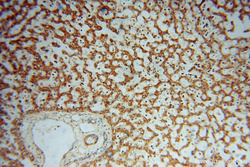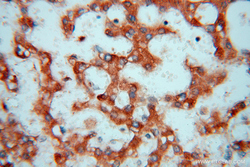Antibody data
- Antibody Data
- Antigen structure
- References [19]
- Comments [0]
- Validations
- Western blot [1]
- Immunohistochemistry [2]
Submit
Validation data
Reference
Comment
Report error
- Product number
- 16000-1-AP - Provider product page

- Provider
- Proteintech Group
- Proper citation
- Proteintech Cat#16000-1-AP, RRID:AB_2103936
- Product name
- FGL1 antibody
- Antibody type
- Polyclonal
- Description
- KD/KO validated FGL1 antibody (Cat. #16000-1-AP) is a rabbit polyclonal antibody that shows reactivity with human, mouse, rat and has been validated for the following applications: IHC, IP, WB,ELISA.
- Reactivity
- Human, Mouse, Rat
- Host
- Rabbit
- Conjugate
- Unconjugated
- Isotype
- IgG
- Vial size
- 20ul, 150ul
Submitted references FGL1 in plasma extracellular vesicles is correlated with clinical stage of lung adenocarcinoma and anti-PD-L1 response.
Increased FGL1 Expression Predicts Poor Prognosis and Promotes EMT in Head and Neck Squamous Cell Carcinoma.
Fibrinogen-like protein 1 promotes liver-resident memory T-cell exhaustion in hepatocellular carcinoma.
Targeting fibrinogen-like protein 1 enhances immunotherapy in hepatocellular carcinoma.
Compensatory Increase of Serum Hepassocin Protects Hyperthyroidism-Induced Hepatic Dysfunction.
Dual immunological and proliferative regulation of immune checkpoint FGL1 in lung adenocarcinoma: The pivotal role of the YY1-FGL1-MYH9 axis.
The downregulation of fibrinogen-like protein 1 inhibits the proliferation of lung adenocarcinoma via regulating MYC-target genes.
Proteomics identifies a novel role of fibrinogen-like protein 1 in Crohn's disease.
Fibrinogen-Like Protein 1 Modulates Sorafenib Resistance in Human Hepatocellular Carcinoma Cells.
Eicosapentaenoic Acid Inhibits KRAS Mutant Pancreatic Cancer Cell Growth by Suppressing Hepassocin Expression and STAT3 Phosphorylation.
Regulating the immunosuppressive tumor microenvironment to enhance breast cancer immunotherapy using pH-responsive hybrid membrane-coated nanoparticles.
Oxysophocarpine suppresses hepatocellular carcinoma growth and sensitizes the therapeutic blockade of anti-Lag-3 via reducing FGL1 expression.
The co-expression characteristics of LAG3 and PD-1 on the T cells of patients with breast cancer reveal a new therapeutic strategy.
Targeting fibrinogen-like protein 1 is a novel therapeutic strategy to combat obesity.
Role of placental fibrinogen-like protein 1 in gestational diabetes.
Plasma Fibrinogen-Like 1 as a Potential Biomarker for Radiation-Induced Liver Injury.
Unsaturated Fatty Acids Increase the Expression of Hepassocin through a Signal Transducer and Activator of Transcription 3-Dependent Pathway in HepG2 Cells.
The Hepatic Protection Effects of Hepassocin in Hyperglycemic Crisis.
A novel hepatokine, HFREP1, plays a crucial role in the development of insulin resistance and type 2 diabetes.
Zhang Y, Zhang K, Wen H, Ge D, Gu J, Zhang C
Clinical and experimental immunology 2024 Mar 12;216(1):68-79
Clinical and experimental immunology 2024 Mar 12;216(1):68-79
Increased FGL1 Expression Predicts Poor Prognosis and Promotes EMT in Head and Neck Squamous Cell Carcinoma.
Pan Z, Hu W, Huang J, Zheng Z, Lin E, Wang P, Mao L
Biochemical genetics 2024 Jun;62(3):2066-2081
Biochemical genetics 2024 Jun;62(3):2066-2081
Fibrinogen-like protein 1 promotes liver-resident memory T-cell exhaustion in hepatocellular carcinoma.
Yang C, Qian Q, Zhao Y, Huang B, Chen R, Gong Q, Ji H, Wang C, Xia L, You Z, Zhang J, Chen X
Frontiers in immunology 2023;14:1112672
Frontiers in immunology 2023;14:1112672
Targeting fibrinogen-like protein 1 enhances immunotherapy in hepatocellular carcinoma.
Lin M, He J, Zhang X, Sun X, Dong W, Zhang R, Xu Y, Lv L
The Journal of clinical investigation 2023 May 1;133(9)
The Journal of clinical investigation 2023 May 1;133(9)
Compensatory Increase of Serum Hepassocin Protects Hyperthyroidism-Induced Hepatic Dysfunction.
Wang CC, Lin CH, Chou HW, Wang CT, Liang YC, Wu HT, Ou HY
Biomedicines 2023 Jul 7;11(7)
Biomedicines 2023 Jul 7;11(7)
Dual immunological and proliferative regulation of immune checkpoint FGL1 in lung adenocarcinoma: The pivotal role of the YY1-FGL1-MYH9 axis.
Tang XY, Xiong YL, Zhao YB, Yang J, Shi AP, Zheng KF, Liu YJ, Shu C, Jiang T, Ma N, Zhao JB
Frontiers in immunology 2022;13:1014053
Frontiers in immunology 2022;13:1014053
The downregulation of fibrinogen-like protein 1 inhibits the proliferation of lung adenocarcinoma via regulating MYC-target genes.
Tang XY, Xiong YL, Shi AP, Sun Y, Han Q, Lv Y, Shi XG, Frattini M, Malhotra J, Zheng KF, Liu YJ, Jiang T, Ma N, Zhao JB
Translational lung cancer research 2022 Mar;11(3):404-419
Translational lung cancer research 2022 Mar;11(3):404-419
Proteomics identifies a novel role of fibrinogen-like protein 1 in Crohn's disease.
Sun XL, Qiao LC, Gong J, Wen K, Xu ZZ, Yang BL
World journal of gastroenterology 2021 Sep 21;27(35):5946-5957
World journal of gastroenterology 2021 Sep 21;27(35):5946-5957
Fibrinogen-Like Protein 1 Modulates Sorafenib Resistance in Human Hepatocellular Carcinoma Cells.
Son Y, Shin NR, Kim SH, Park SC, Lee HJ
International journal of molecular sciences 2021 May 19;22(10)
International journal of molecular sciences 2021 May 19;22(10)
Eicosapentaenoic Acid Inhibits KRAS Mutant Pancreatic Cancer Cell Growth by Suppressing Hepassocin Expression and STAT3 Phosphorylation.
Chiu CF, Hsu MI, Yeh HY, Park JM, Shen YS, Tung TH, Huang JJ, Wu HT, Huang SY
Biomolecules 2021 Mar 2;11(3)
Biomolecules 2021 Mar 2;11(3)
Regulating the immunosuppressive tumor microenvironment to enhance breast cancer immunotherapy using pH-responsive hybrid membrane-coated nanoparticles.
Gong C, Yu X, Zhang W, Han L, Wang R, Wang Y, Gao S, Yuan Y
Journal of nanobiotechnology 2021 Feb 25;19(1):58
Journal of nanobiotechnology 2021 Feb 25;19(1):58
Oxysophocarpine suppresses hepatocellular carcinoma growth and sensitizes the therapeutic blockade of anti-Lag-3 via reducing FGL1 expression.
Wang J, Wei W, Tang Q, Lu L, Luo Z, Li W, Lu Y, Pu J
Cancer medicine 2020 Oct;9(19):7125-7136
Cancer medicine 2020 Oct;9(19):7125-7136
The co-expression characteristics of LAG3 and PD-1 on the T cells of patients with breast cancer reveal a new therapeutic strategy.
Du H, Yi Z, Wang L, Li Z, Niu B, Ren G
International immunopharmacology 2020 Jan;78:106113
International immunopharmacology 2020 Jan;78:106113
Targeting fibrinogen-like protein 1 is a novel therapeutic strategy to combat obesity.
Wu HT, Chen SC, Fan KC, Kuo CH, Lin SY, Wang SH, Chang CJ, Li HY
FASEB journal : official publication of the Federation of American Societies for Experimental Biology 2020 Feb;34(2):2958-2967
FASEB journal : official publication of the Federation of American Societies for Experimental Biology 2020 Feb;34(2):2958-2967
Role of placental fibrinogen-like protein 1 in gestational diabetes.
Kang L, Li HY, Ou HY, Wu P, Wang SH, Chang CJ, Lin SY, Wu CL, Wu HT
Translational research : the journal of laboratory and clinical medicine 2020 Apr;218:73-80
Translational research : the journal of laboratory and clinical medicine 2020 Apr;218:73-80
Plasma Fibrinogen-Like 1 as a Potential Biomarker for Radiation-Induced Liver Injury.
Han NK, Jung MG, Jeong YJ, Son Y, Han SC, Park S, Lim YB, Lee YJ, Kim SH, Park SC, Lee HJ
Cells 2019 Sep 6;8(9)
Cells 2019 Sep 6;8(9)
Unsaturated Fatty Acids Increase the Expression of Hepassocin through a Signal Transducer and Activator of Transcription 3-Dependent Pathway in HepG2 Cells.
Cheng KP, Ou HY, Hung HC, Li CH, Fan KC, Wu JS, Wu HT, Chang CJ
Lipids 2018 Sep;53(9):863-869
Lipids 2018 Sep;53(9):863-869
The Hepatic Protection Effects of Hepassocin in Hyperglycemic Crisis.
Ou HY, Wu HT, Lin CH, Du YF, Hu CY, Hung HC, Wu P, Li HY, Wang SH, Chang CJ
The Journal of clinical endocrinology and metabolism 2017 Jul 1;102(7):2407-2415
The Journal of clinical endocrinology and metabolism 2017 Jul 1;102(7):2407-2415
A novel hepatokine, HFREP1, plays a crucial role in the development of insulin resistance and type 2 diabetes.
Wu HT, Ou HY, Hung HC, Su YC, Lu FH, Wu JS, Yang YC, Wu CL, Chang CJ
Diabetologia 2016 Aug;59(8):1732-42
Diabetologia 2016 Aug;59(8):1732-42
No comments: Submit comment
Supportive validation
- Submitted by
- Proteintech Group (provider)
- Main image

- Experimental details
- HeLa cells were subjected to SDS PAGE followed by western blot with 16000-1-AP(FGL1 antibody) at dilution of 1:500
- Sample type
- cell line
Supportive validation
- Submitted by
- Proteintech Group (provider)
- Main image

- Experimental details
- Immunohistochemical of paraffin-embedded human liver using 16000-1-AP(FGL1 antibody) at dilution of 1:100 (under 10x lens)
- Sample type
- tissue
- Submitted by
- Proteintech Group (provider)
- Main image

- Experimental details
- The FGL1 antibody from Proteintech is a rabbit polyclonal antibody to a recombinant protein of human FGL1. This antibody recognizes human, mouse, rat antigen. The FGL1 antibody has been validated for the following applications: ELISA, WB, IHC analysis.
 Explore
Explore Validate
Validate Learn
Learn Western blot
Western blot ELISA
ELISA